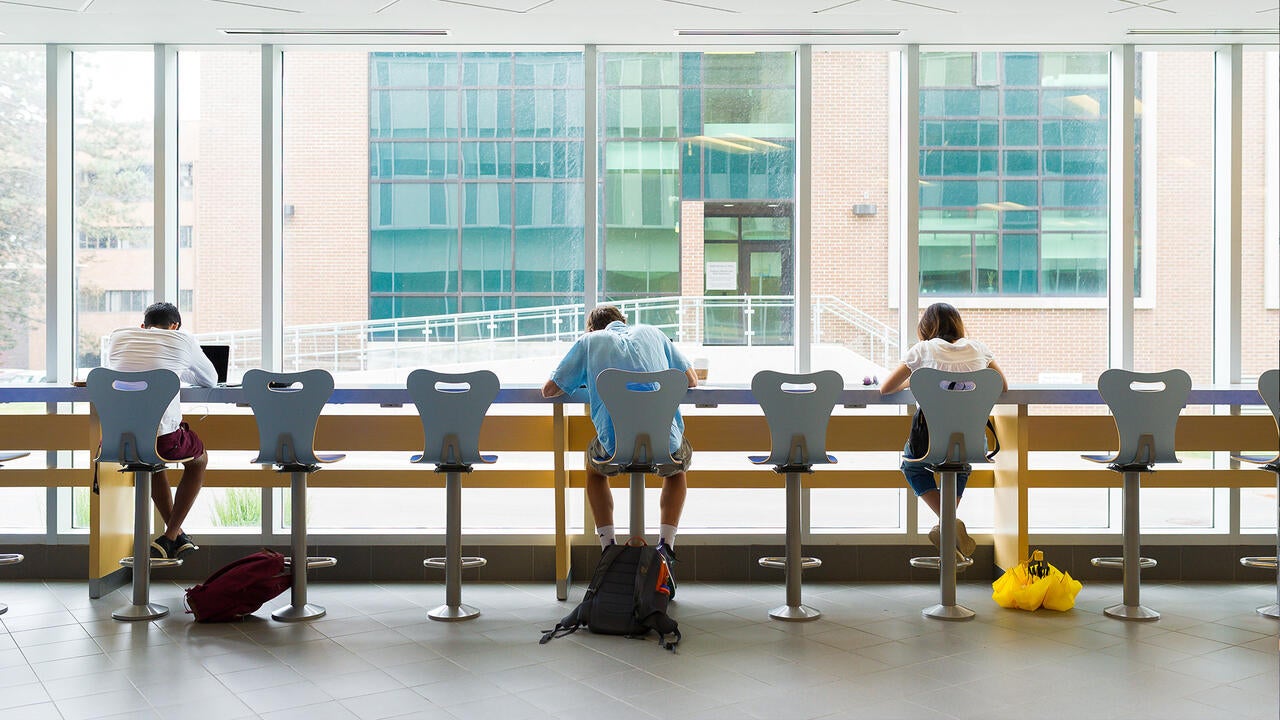
Five ways to end the stigma and start a conversation
Mental health tips to keep your perspectives positive and clear

Mental health tips to keep your perspectives positive and clear
By Jennifer Halcrow Student Success OfficeJanuary is often thought of as a month of new perspectives, fresh starts and hope for what the new year will bring. But for many of us, the grey weather, the uncertainty of the COVID-19 pandemic, along with the struggle to find student-life or work-life balance can take a heavy toll on our mental health.
Recognizing Bell Let’s Talk Day, this year’s campaign focuses on supporting ourselves and each other through five proactive steps. While these five actions may feel small, they can create a significant impact on our community by ending the stigma around mental health and demonstrating your care for fellow members within our community.
As Jazz Fitzgerald, Student Equity Specialist in the Student Success Office, reflects on their struggles with depression and anxiety, they ask themselves “How might the language we use today validate the humanity of those around us?” Associating these mental health struggles as consequences keeping them from showing up in the world as their full self, Fitzgerald says a lot changed in their life after they decided to come out as queer and non-binary, like the language people used when speaking to them. “Folks around me started using my correct name and pronouns. The language they used when referring to me finally made me feel seen, heard and loved.” It’s important to recognize that the words we choose make all the difference and they have the power to hurt or help those around us.
When it comes to mental illness, education is key. Knowing the facts and myths about mental illness is a great way to help end the stigma and help to support yourself and others. The Mental Health Continuum model was developed by the Mental Health Commission of Canada and gives us a model to understand the full spectrum of mental health. Campus Wellness has compiled a variety of resources to support your mental health, including tips for self-care, resiliency strategies or ways to combat Seasonal Affective Disorder (SAD). Understanding the resources available to you and where to seek support when you need it is crucial, regardless of where you find yourself within the continuum on any given day.
The smallest of gestures can create a lasting impact. Leading with kindness and compassion goes a long way to making someone feel seen and heard. A simple smile, being a good listener or an open invitation to chat are simple acts of kindness that can help open the conversation and let someone know you’re there for them. We’re starting the conversation through the @UWaterloolife Instagram where Neaa Rodrigues, a Waterloo student on co-op at Campus Wellness, will be sharing her kindness tips and taking a deep dive into resources available from the Campus Wellness team.
Being a good listener and asking how you can help can be the first step in supporting someone towards recovery. It can be difficult to recognize the signs of someone who is struggling and even more difficult to understand your role in supporting them. It’s important to remember the limitations of your own knowledge, but that doesn’t mean you should back away from offering support. Gain confidence and feel empowered to help those around you by reading the “How to help a friend” resource from Campus wellness.
Break the silence, and don’t stop after Bell Let’s Talk day wraps up for 2022. It’s important to remember that mental health is an important topic to keep top of mind all year long and that just because Bell’s campaign is a one-day event, does not mean the conversation has to end. Continue to discover the available tips for your mental health and wellbeing and remember that physical activity is an excellent way to proactively build and maintain positive mental health.
Know that support is available for you if you are struggling. Get mental health support when you need it. Explore the list of available resources and contact information, including some of the go-to suggestions below:
On-campus contacts (8:30 a.m. – 4:30 p.m.)
Counselling Services - 519-888-4567 ext. 42655
Offers appointments for emergencies. We are currently providing services by phone and video.
Health Services - Student Medical Clinic - 519-888-4096. Open for all medical services, with modified or alternative service delivery. All appointments will be addressed via phone or video if possible.
UW Police - 519-888-4567 ext. 22222
For emergency services on campus 24/7.
After-hours contacts
Non-emergency Waterloo Regional Police Services - 519-653-7700
Grand River Hospital - 519-749-4300
St. Mary's Hospital - 519-744-3311
Good2Talk - 1-866-925-5454
Confidential and anonymous
Available to all Ontario post-secondary students
Here 24/7 - 1-844-437-3247
Supports addictions, mental health and crisis services
Walk-in options available
Available to all Ontario post-secondary students
Empower Me, Mental Health Resources - 1-833-628-5589
Counselling is available via phone, video, and in person
Available 24/7, 365 days in 22 countries worldwide
Crisis Services Canada - 1-833-456-4566 or by text 45645
Kitchener-Waterloo Sexual Assault Support Centre - 519-741-8633
Huron Perth Helpline (Stratford) - 1-888-829-7484
Stratford General Hospital - 519-272-8210
Cambridge Memorial Hospital - 519-621-2330

Read more
Waterloo alum shares her mental health story

Read more
Upside Robotics secures new funding to accelerate the future of sustainable farming

Read more
Discover the meticulous work that uncovered Black stories on campus and preserved them for the future
The University of Waterloo acknowledges that much of our work takes place on the traditional territory of the Neutral, Anishinaabeg, and Haudenosaunee peoples. Our main campus is situated on the Haldimand Tract, the land granted to the Six Nations that includes six miles on each side of the Grand River. Our active work toward reconciliation takes place across our campuses through research, learning, teaching, and community building, and is co-ordinated within the Office of Indigenous Relations.